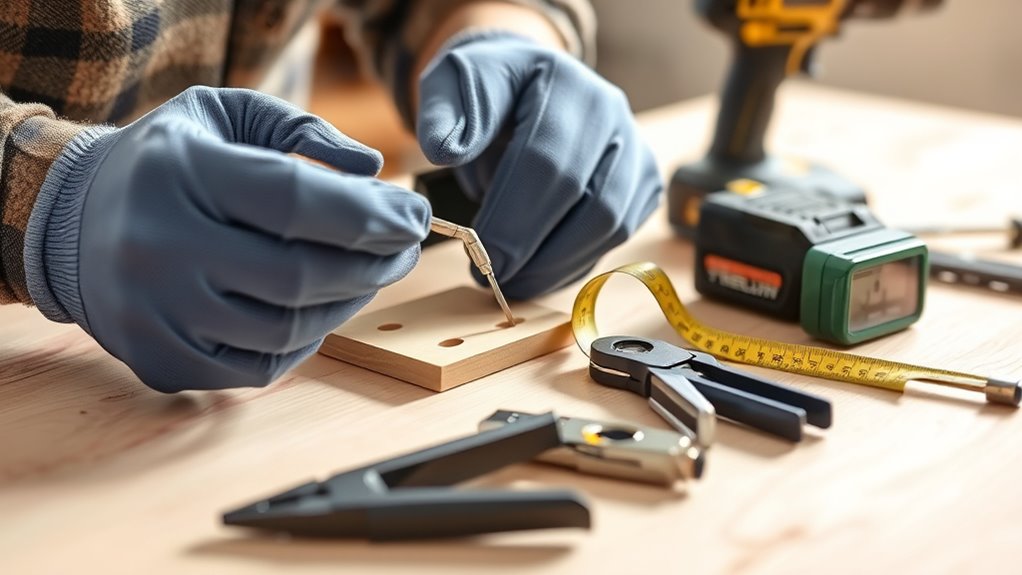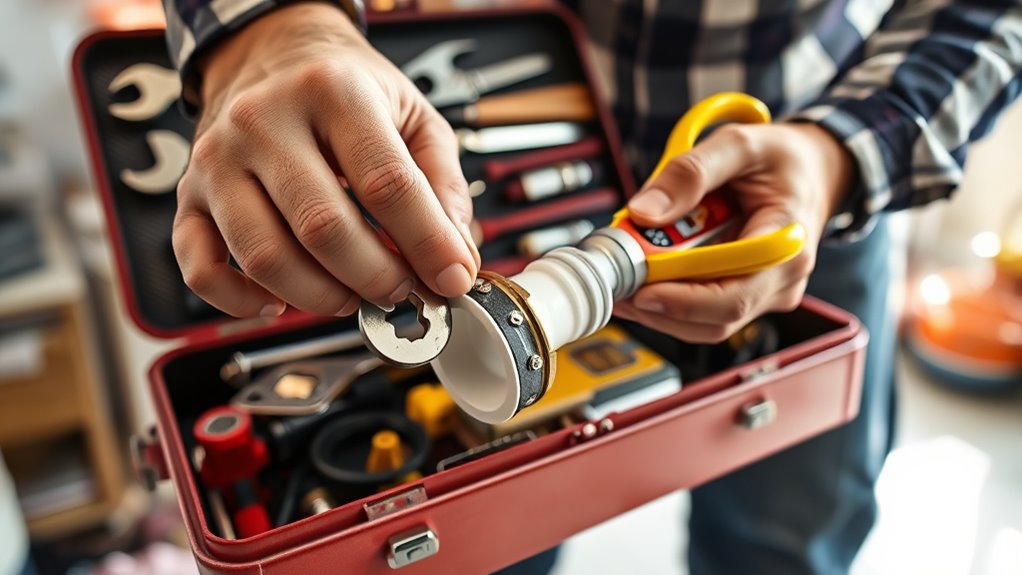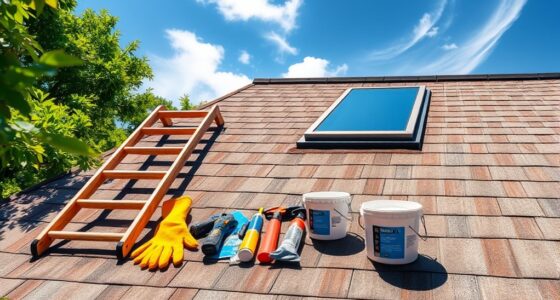When tackling simple DIY repairs, always plan ahead and organize your tools for efficiency. Wear safety gear and handle tools carefully to prevent accidents. Follow instructions closely and don’t rush through steps, as shortcuts can lead to mistakes. Avoid skipping safety checks or neglecting tool maintenance. Staying mindful of these do’s and don’ts helps make certain of safety and success. Keep going, and you’ll discover how to make your repairs smoother and safer every time.
Key Takeaways
- Plan your repair thoroughly and gather all necessary tools before starting.
- Always wear protective gear and handle tools carefully to ensure safety.
- Follow step-by-step instructions and avoid rushing to prevent mistakes.
- Regularly inspect and maintain tools to ensure proper functioning and safety.
- Organize materials for easy access and avoid skipping safety precautions.
Essential Do’s for Effective DIY Repairs

Ever wonder what makes a DIY repair successful? It all starts with proper planning. Before grabbing tools, take time to understand the task and gather the right supplies. This helps you avoid rushing and makes the process smoother. Tool safety is also vital; always wear protective gear and handle tools carefully. Check that tools are in good condition and use them as intended. Planning ahead reduces mistakes and guarantees you have everything needed, saving time and frustration. Using appropriate essential oils can also help create a calming environment during your project. By organizing your approach and prioritizing safety, you set a strong foundation for a successful repair. Remember, a well-planned project minimizes risks and delivers better results, making your DIY experience more rewarding.
Common Don’ts to Avoid Costly Mistakes

To prevent costly mistakes during DIY repairs, you should avoid rushing into the project without proper preparation. Jumping in without planning can lead to accidents or damage. Here are key don’ts to keep in mind:
- Don’t use power tools without reading the instructions and wearing appropriate safety gear.
- Don’t skip inspecting your tools and materials before starting.
- Don’t ignore safety precautions—always wear gloves, goggles, and ear protection.
- Don’t hurry the job; take your time to ensure each step is done correctly.
- Don’t overlook tool maintenance—properly caring for your tools can prevent malfunctions and injuries.
Frequently Asked Questions
What Tools Are Essential for Beginner DIY Repairs?
For beginner DIY repairs, you’ll need a few essential tools. A power drill is versatile for drilling holes and driving screws efficiently. Screwdrivers, both flat-head and Phillips, are vital for assembling or disassembling items. Keep a set of these handy along with a tape measure, level, and pliers. These tools will help you handle most simple repairs confidently and safely, making your projects smoother and more successful.
How Do I Identify the Root Cause of a Problem?
Identifying the root cause is like peeling an onion—sometimes you find layers hiding the real issue. Use diagnostic techniques like checking for visible damage, listening for unusual sounds, or testing components systematically. Troubleshooting strategies involve ruling out simple causes first, then narrowing down options. Keep notes of your observations and test results; this helps you stay organized and pinpoint the problem faster, saving you time and frustration.
When Should I Call a Professional Instead of DIY?
You should call a professional when your home renovation involves complex issues, safety risks, or if you’re unsure about your skills. If a repair exceeds your budget planning or requires specialized tools, don’t push it. DIY might save money, but some projects demand expert knowledge to avoid costly mistakes. Trust your judgment—when in doubt, consulting a pro guarantees safety, quality, and long-term savings.
How Can I Prevent Future Damage During Repairs?
You can prevent future damage during repairs by taking safety gear seriously and planning properly, avoiding chaos like a tornado. Always wear gloves, goggles, and masks to protect yourself from hazards. Before starting, review detailed instructions and gather all necessary tools to avoid rushing. This prevents mistakes that could cause damage. Patience and attention to detail are your best allies, transforming your repair into a smooth, damage-free success story.
Are There Safety Precautions for Working With Electricity?
You should always prioritize electrical safety and follow power precautions when working with electricity. Turn off the power supply at the circuit breaker before starting any repair, and use insulated tools to prevent shocks. Wear rubber gloves and safety goggles for added protection. Never work on live wires, and double-check that the circuit is de-energized. Always stay cautious and follow safety guidelines to avoid accidents during electrical repairs.
Conclusion
By keeping these do’s and don’ts in mind, you’ll turn your DIY projects into smooth sailing instead of stormy seas. Think of each repair as planting a sturdy seed—you’ll enjoy the fruits of your labor without the worry of a wilted plant. With patience and care, you’ll see your home transform, brick by brick, nail by nail. So grab your tools, stay cautious, and let your confidence grow stronger with every successful fix.









